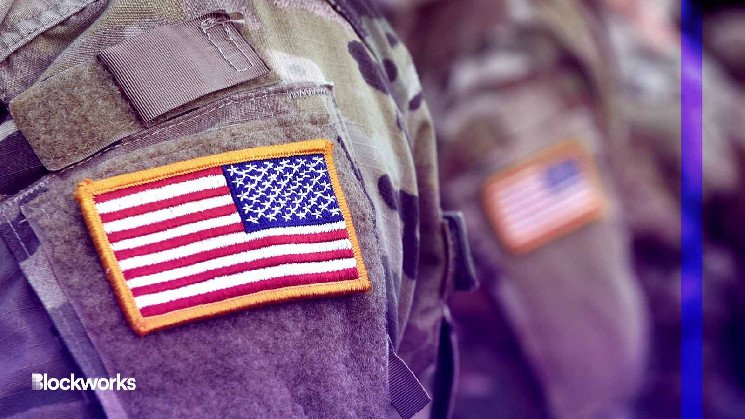Blockchain
The Biden White House may be waging war on crypto, but that hasn’t stopped the US Department of Defense from pushing the boundaries of blockchain.
The Department of Defense, or DOD, just signed a contract with a six-year-old blockchain startup — a major move for the industry.
Founded in 2017, Constellation is a founder-led blockchain ecosystem with a strong focus on processing big data. The infrastructure is set up to support decentralized data markets and preserve the provenance and integrity of data.
The San Francisco-based company said Thursday that the completion of its “Phase II” DOD contract has resulted in a “well-defined deliverable prototype.” The United States Air Force (UASF) began contracting Constellation in 2019 through a DOD partnership.
The US military saw Constellation as a way to modernize the cybersecurity of its backend systems. The Phase II contract continued research and development to evaluate the platform’s commercial potential, including deal sizes up to $1 million.
The idea was to explore whether the blockchain could “provide a secure way to effectively and efficiently transfer confidential data to our Defense Transportation System commercial air transportation partners without sacrificing cost or speed,” said Christopher Stuhldreher, senior cyber operations officer. analyst from UASF, in a statement.
Phase III, meanwhile, will look at commercialization based on previous phases without any limitation on contract length or value. A Constellation statement said the prototype was “defense approved”.
“This contract proves the core promises of what distributed ledger technology can and will continue to bring forward,” Benjamin Diggles, chief strategy officer and co-founder of Constellation, told Blockworks.
Data is paramount to federal communications, he explained. Refining the way that data is shared has great potential to impact the way information warfare is fought in the modern age.
“Knowing that the closer we get to the data source, the cleaner the attribution, as well as the ability to secure end-to-end data pipelines,” said Diggles.
Look at the stars
Constellation is the architect of what it calls the Hypergraph Transfer Protocol (HGTP). It is a tool for Web3 developers to encrypt, authenticate and process data on various digital platforms.
The HGTP is to blockchain what its founders say HTTP is to the internet – the primary channel for efficient data communication between servers and clients.
The company also released its own software development kit, Euclid, which was intended to help Web3 developers launch blockchain-powered projects and eventually coin tokens on its blockchain system, “Hypergraph”.
Constellation’s native token DAG helps incentivize strikers to join the network as data validators. DAG is currently down about 10% year-to-date and more than 90% below its all-time high in August 2021, during the heat of the last bull run.
Blockworks has reached out to confirm whether the prototype built for the DOD uses Constellation’s mainnet – and whether it communicates directly with DAG.
More broadly, Diggles said the defense’s receptiveness to crypto itself is mixed: “Many people within the U.S. military see the clear promise, while others focus only on the nefarious activities associated with crypto so far.”
Changing that mindset will require education about the potential benefits of using crypto for federal efforts, he added.
“While the DOD has a higher priority around features such as security and notarization, we promoted the importance of linking cryptocurrencies with data validation as much as possible.”
US military hot and cold on crypto
According to Constellation’s value proposition, establishing methods for scalable data security, validation, and attribution within data pipelines could open up opportunities for crypto within those systems.
It’s a pitch that harkens back to prominent projects in the past, most notably IOTA’s quest to lubricate machine-to-machine communication with blockchain tokens.
In any case, Constellation said it has explored a number of crypto use cases with the DOD:
- Purchase: Payments and settlement layers in federal procurement workflows.
- Fractionated licenses: Real-time micropayments for licensing microservices.
- Secure System Access: Gated identity systems unlocked with NFTs, for example common access cards.
For now, it’s “one step at a time,” as the military won’t entertain crypto until there are guarantees in the technology’s base layer network, Diggles said.
“Those involved in Web3 solutions within the federal government know it’s a piece of cake,” he said. “At the bottom you have security, in the middle you have automation of decentralized applications, and at the top you have cryptocurrencies to securely optimize workflows.”
Constellation hopes to commercialize those first two tiers by focusing on what it sees as the biggest benefit of using blockchain networks: crypto as “real utilities.”
The startup is not the only blockchain unit working to improve military capabilities in the information technology race.
Earlier this year, the US Air Force also invested $30 million in blockchain-as-a-service provider SIMBA Chain to further develop a supply chain quality and management system.

